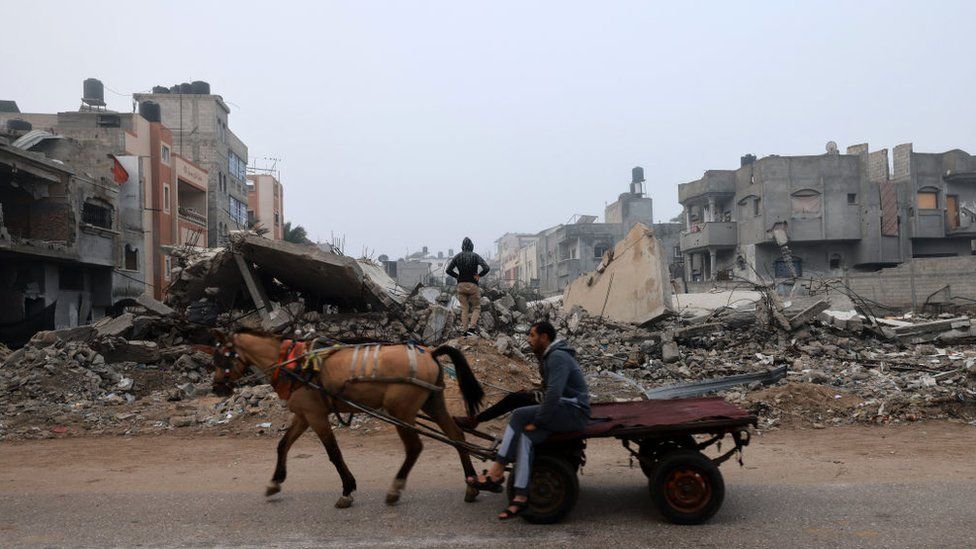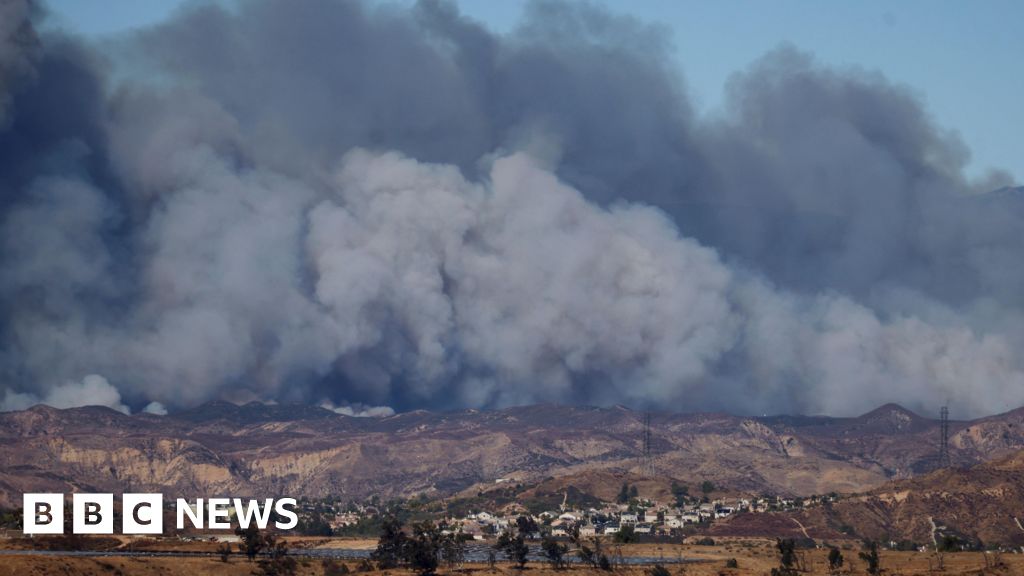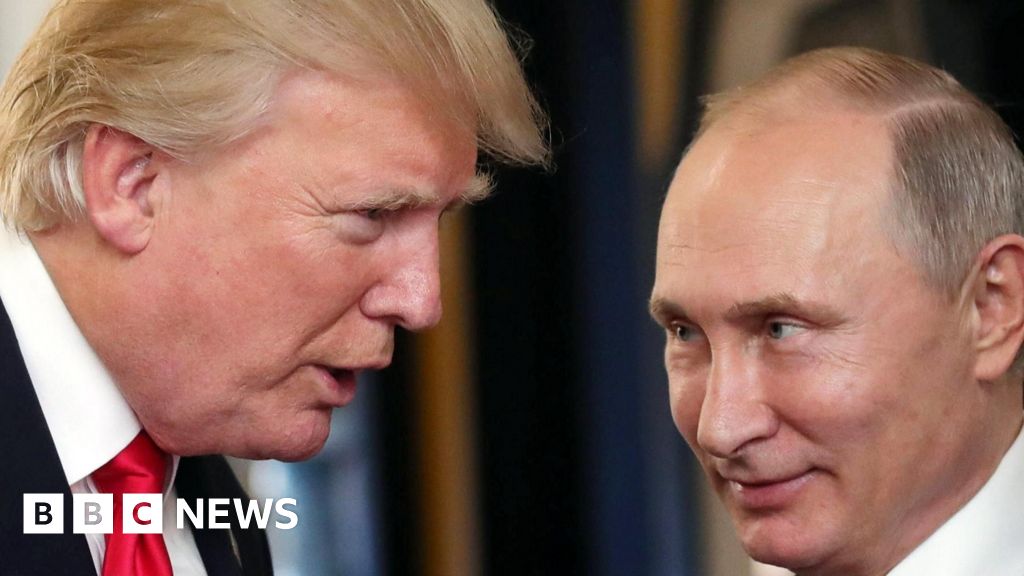ARTICLE AD BOX
 Image source, Getty Images
Image source, Getty Images
A man rides a horse-pulled cart in Rafah
By Brandon Drenon
BBC News
As deadly Israeli bombardments and acute food shortages continue, and a threatened Israeli military operation in southern Gaza looms, more and more Palestinians are seeking a way out - if they can find the money for it.
This uncertain exit requires people to pay thousands of dollars and navigate scammers and misinformation to get their names onto a list of people approved to leave via the Rafah crossing to Egypt.The crossing is closed to the vast majority of people under an Egyptian-Israeli blockade against Hamas. Only some foreign passport holders and their dependents have been able to leave, as well as some seriously wounded and sick people and those accompanying them.However, a parallel system exists whereby Gazans pay Egyptian brokers to get on a list of people who can leave. Depending on who you talk to, prices range from $6,000 (£4,800) per person to over $12,000 - exorbitant sums for most of Gaza's population.Yet increasing numbers of people are trying to raise the money to flee. Among them are the Hammads, currently displaced along with more than a million others in Rafah next to the Egyptian border. Their 15-year-old son Ibrahim has Down's Syndrome. For him, the Israeli bombardment is particularly traumatic. Video posted by the family shows him shaking in distress after each thunderous boom from nearby airstrikes. His father Abed Alqader says they have had to artificially resuscitate him three times after he stopped breathing due to severe panic attacks. He says Ibrahim has been begging for the family to leave, saying "Please father, I cannot continue". "For the last five months, all you hear are sounds of bombs, heavy bombing," Mr Hammad added. "You just sit home and pray you will not be next."
Image source, Abed Alqader/ Facebook
Image caption,Ibrahim Hammad pictured inside the Gaza Strip after 7 October
Their online fundraising page, like most, is being managed outside Gaza, in their case by another son Amjad, who lives in Europe. It is one fundraiser among thousands, appealing for donors to assist Gazans to "survive", "evacuate" and "escape genocide". Some campaigns have been successful, raising over $100,000. However, the BBC spoke to several of these account holders who, even after achieving their fundraising goals, said their desperate attempts to help loved ones were mired in chaos and confusion. In the words of one fundraiser, a New Jersey woman who asked to remain anonymous to avoid risking the chance of hindering her cousin's way out: "Every day is a toss-up." A complex route out The first challenge is determining the cost to leave. Fundraising account holders who spoke to the BBC said the most common price was $6,000 per person, allowing people to leave within 72 hours. Some people fundraise toward the goal of $12,000 per person, the price said to get an exit within 24 hours. Once enough money is raised, the next challenge becomes getting tens of thousands of dollars into Gaza. There are few wire services like Western Union left in the devastated territory, and the line to enter is days-long. Some people have used cryptocurrency exchanges. Others have relied on PayPal accounts registered elsewhere, as the firm doesn't provide services to people in Gaza or the occupied West Bank. Most people, however, wire the money to someone outside of Gaza - a relative or friend in Europe - who then withdraws the cash, and travels to Egypt to wait in a separate days-long line at the offices of Hala Travel in Cairo, an agency that facilitates travel between Egypt and Gaza. Footage from outside the Hala offices shows crowds thronging the street.Hala has not responded to requests for comment from the BBC. However, the BBC has obtained a copy of a receipt from Hala Travel dated 13 February for $6,000. The person's name on that receipt also appears with four others on a separate ticket indicating they have been cleared for entry into Egypt. Visas and onward travel to Cairo are included. The final step is to check for approval online. Places like the Gaza Ministry of Foreign Affairs Facebook account publish daily lists of up to 250 approved names. All have paid thousands to get out, according to the person who provided the receipt, who asked to remain anonymous. People whose names appear on the official list must leave the same day. However, due to spotty WiFi service and rolling blackouts, some people miss their window to exit and have to repeat the entire process, including paying again, this person says. The man who provided the Hala receipt told the BBC that the names of those on the official list to enter Egypt only appear after they've been vetted by Egyptian intelligence. "Is this new? No. It's not really new, but the price before the war was $600. Now it's 10 times higher," he says. "Gaza is not only under bombardment, but people are profiting from their suffering." Hamas, the Palestinian group which was governing Gaza and launched the attack targeting civilians in southern Israel that triggered the current war, has also accused "companies, individuals and people with influence" of exploiting Gazans by "making them pay exorbitant amounts to coordinate their travel".Egypt's Foreign Minister Sameh Shoukry has told Sky News that his country is investigating.We will take whatever measures that we need so as to restrict it and eliminate it immediately," he said, without giving further details.In January, Egypt's State Information Service head Diaa Rashwan "categorically denied the allegations related to the collection of additional fees from travellers from Gaza, as well as claims that an unofficial entity collected fees for the passage to Egyptian lands". Egypt was trying to help Gaza's Palestinians, he added, and did not want to impose extra burdens on them. Large sums raised
Much of the crowdfunding is being led by friends and relatives who live abroad and have looked on helplessly as Israeli bombardment kills whole families and reduces neighbourhoods to rubble. "It's heartbreaking to watch," says Shahd, a woman in the US state of Virginia who asked only to go by her first name. She helped organise a campaign for her friends, two brothers, whom she met on TikTok in 2021. Her own relatives in Gaza were killed in October, she says. Shahd felt compelled to aid her friends after witnessing their narrow escapes from death - on one occasion being hit by flying masonry as a nearby building exploded. Since then, they have been struggling to survive amid Gaza's deepening humanitarian crisis and, they say, navigating the gang rule that has replaced social cohesion. "There's moments where [the brothers] are like, 'We really can't do this anymore. It might be better if we were killed'," Shahd says. "They're basically like family to me at this point. If anything were to happen to them, I'd probably lose it."
Image source, Getty Images
Image caption,A man in Rafah clears rubble from a building hit by an airstrike
The fundraising page for Shahd's friends and some of their family has reached over $105,000. But sending it to them has been difficult. Their fundraising account was frozen for several days in February, blocking her from transferring the money. And the brothers' PayPal accounts were locked for weeks without explanation. Multiple users raising money to aid people in Gaza have complained about having their accounts frozen. "People are literally trying to escape death," one New Jersey woman told the BBC. "It's just mind-blowing that every single corner we turn there's a new obstacle." Having raised $36,000, she says she missed a window to get her cousin and his family on the list while the company froze her account for several days in early February and asked for more information. She said the request, the first she's had in a decade of using the platform, felt "discriminatory". Nearly every person told the BBC they had the same experiences with delays, and multiple said they had to resort to legal threats before getting a response. GoFundMe, one of the platforms people are using to raise money, told the BBC its priority was "protecting the generosity of donors". "GoFundMe has already helped deliver tens of millions of dollars to individuals and organizations supporting those in both Israel and Gaza, and we will continue to do so as quickly, securely, and safely as possible," spokesman Jalen Drummond said. "Any suggestion of discrimination is wholly without merit, baseless, and contrary to the values that guide our platform." Jordan, from Brooklyn, New York, has hit his fundraising target of $50,000 and plans to wire it directly to his friend's bank in Gaza. His friend's family must leave to access life-saving medicine. More than 1.5 million people are in Rafah, most of whom have fled there to escape the fighting, but only a slim minority have connections to people abroad who can help, a reality Jordan described as "really dark".
'I'm pretty much alive'
Ahmad, who lives in Gaza but has a friend in Canada fundraising for him, says he has to leave because of chronic knee inflammation, the medication for which is no longer available in Gaza. "Me and anyone in Gaza may die in any second," he said from the rooftop of a building in Rafah, Israeli drones buzzing in the background. Earlier that day, on 12 February, he sent the BBC a picture of two girls who he said died overnight in a nearby air strike. "I'm pretty much alive," he said in the same WhatsApp message. "Very depressed bro."
Image source, Ahmad
Image caption,Two girls who Ahmad said died in an Israeli airstrike near his home in Rafah
The 24-year-old has been fundraising for weeks but still hasn't found a way out of Gaza.
First, his fundraising account was frozen. As a result, he had to borrow thousands of dollars from his parents - who are resigned to staying in the war-zone - to pay some middlemen whom he trusted to facilitate getting him on the exit list.His plan failed after giving them $5,000, and he had to fork out another $3,000 to resolve the issue. He promised his parents he would pay them back once he got to Cairo and could access the money raised by crowdfunding.Ahmad is still waiting. On Thursday, reached by text message, he said he was in deep pain and feeling very anxious.But he felt hopeful he was on the verge of finally getting out of Gaza. It's happening, he said, "anytime soon".

 10 months ago
38
10 months ago
38








 English (US) ·
English (US) ·